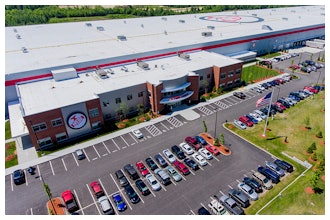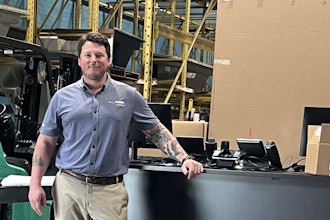
GOTHENBURG, Sweden — On Feb. 3, bearings maker SKF detailed plans for a new strategic framework that includes a decentralized operating model.
Rickard Gustafson, President and CEO:
“SKF has something that very few industrial companies have: a deep understanding of almost all industrial applications. Everywhere there is rotation, there is a good chance that SKF products, capabilities and skilled colleagues are providing value in the form of improved operational performance and reduced emissions.
SKF’s ability to master the complexity of meeting customer needs across a wide range of industries and numerous geographies, is our greatest strength and a key to our success. Our broad business reach gives us a platform to drive profitable growth, as it allows us to continuously target the most attractive opportunities.
Key megatrends and increased investments in sustainability, digitalization, regionalization and electrification will also provide profitable growth opportunities for SKF.
All in all, SKF is well-positioned to accelerate profitable growth by targeting opportunities where strong market demand matches our ability to differentiate and provide customer value.
READ MORE: SKF's 2021 Sales Improved 9% as Supply Chain Issues Weighed on 2nd Half - published Feb. 3
Successful execution of our strategy will result in a different SKF than today. By 2030, we will strive to:
- Grow faster and double the business, at improved margins
- Be more focused and efficient
- Be the technical partner of choice among our customers
- Lead the development of sustainable solutions
We have defined a strategic framework based on two concepts: intelligent and clean. Intelligent means providing connected and tailored offerings for our customers, as well as using technology to make our operations more efficient. Clean reflects our ability to enable a more sustainable industry, whilst running our own business in a transparent and responsible manner.
These concepts will guide us as we embark on an exciting journey to become a more focused, innovative and profitable industrial player.
We have ambitious plans for the future. With that said, the Group launched updated financial targets only a year ago and we want to deliver on existing commitments before altering them.”
The details of SKF’s strategic framework
Securing intelligent and clean growth
We will accelerate profitable growth, with emphasis on:
- Targeting industries with high growth potential, where SKF has a strong market position and competitive edge, e.g.: high-speed machinery, electric drives, agriculture, wind, railway, food & beverage and robotics & automation.
- Re-positioning the Automotive business to profitable and growing segments where SKF has the lead, including electric vehicles, commercial vehicles and aftermarket parts.
- Developing offers for emerging industries such as hydrogen processing and carbon capture, where SKF is already well-positioned through existing technologies such as magnetic bearings.
- Strengthening the foundation for recurring revenues by simplifying our service offering, addressing a wider market. New technology and partnerships will provide scale and easy access to our data analysis and machine performance competence.
Being selective in our investments also implies that we will deal with the parts of our business that are not generating sufficient returns. Here, we will either improve the performance or trim them from the portfolio.
To deliver on our ambitious growth agenda, we have identified four main enablers:
1. Scaling the pace and impact of innovation and technology development
Focus on developing technologies and solutions that help our customers improve their operations and reduce emissions. We will use insights from connected products to speed up development of new customer offerings and solutions. Over time, we plan to increase R&D expenditure by approximately 50 percent, helping us capture more growth opportunities.
2. Digitalizing the full value chain
Significant progress has been made in digitalizing SKF’s manufacturing operations. As part of our journey to become even more relevant for our customers, investments will be made in connecting the value chain: customers, sales, logistics, manufacturing, supply chain and R&D. This to improve ease of doing business with us and enabling more intelligent decisions in our own operations.
3. Continued investment in automation and regionalization
We will continue to increase our investments in property, plant and equipment, supporting our growth ambitions. Through these investments, regionalization in Asia will grow from approximately 60 percent to more than 85 percent, and for Americas from approximately 40 percent to around 60 percent, further improving our competitiveness and ability to capture profitable growth.
The increased investments will be funded by actions to improve our net working capital and continued cost reduction. These efforts will be supported by a new operating structure and a more regionalized value chain.
4. A decentralized organizational structure with clear accountabilities
SKF’s new operating model and organizational structure places end-to-end operational and financial accountability as close to our customers as possible.
- Four industrial regions: Americas, EMEA, India & Southeast Asia and China & Northeast Asia, further enhancing the ability of our largest and most profitable businesses to serve customers with increased speed and responsiveness.
- One global automotive business: Creating the accountability and transparency needed to improve profitability and re-focus the portfolio. The increased autonomy will also, over time, provide enhanced strategic flexibility.
- Six independent and emerging businesses: Seals, Lubrication, Aerospace, Marine, Magnetic Bearings, RecondOil, creating the focus needed for these to continue to develop profitably and seek growth opportunities also beyond the rotating shaft.
In addition, a lean central function, providing global support.
The new organizational structure is effective from today, with Group Management consisting of the following individuals:
Member — Responsibility
- Rickard Gustafson — President and CEO
- John Schmidt — Americas
- Kent Viitanen — EMEA
- Manish Bhatnagar — India & SEA
- Patrick Tong — China & NEA
- David Johansson — Automotive
- Thomas Fröst — Independent & Emerging Businesses
- Joakim Landholm — Operations and Digital Transformation
- Victoria Van Camp — Technology Development
- Niclas Rosenlew — Finance
- Mathias Lyon — Legal & Compliance
- Ann-Sofie Zaks — People
- Joakim Landholm (born 1969) is currently Partner at Axholmen Consulting. He has previously held senior roles within General Electric, RSA and SAS. He will start his employment with SKF on 15 February.
- Manish Bhatnagar (born 1969) is currently Managing Director of SKF’s operations in India.
- David Johansson (born 1980) is currently Head of SKF’s Global Railway business and China Automotive sales.
- Erik Nelander (born 1963), currently President, Industrial Sales EMEA, will leave Group Management.
“I would like to thank Erik for his contributions as a member of Group Management and his continued commitment to developing SKF,” says Rickard Gustafson.






















